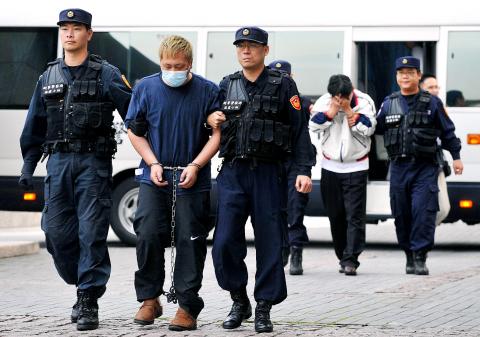Two men suspected of planting suitcase explosive devices on a high-speed rail train and near a lawmaker’s office on Friday last week were repatriated from China yesterday, investigators said.
Investigators made the announcement at a press conference presided over by National Police Agency Director-General Wang Cho-chiun (王卓鈞) yesterday afternoon.
Police said that the two men, surnamed Chu (朱) and Hu (胡), were apprehended and repatriated under the Cross-Strait Agreement on Joint Crime-Fighting and Judicial Mutual Assistance, and arrived at Taiwan Taoyuan International Airport at about 3:30pm under police escort.

Photo: Mandy Cheng, AFP
The pair left for Macau at about 4pm on Friday, just hours after they allegedly planted explosives on a high-speed rail train traveling from Greater Kaohsiung to Taipei, as well as outside Chinese Nationalist Party (KMT) Legislator Lu Chia-chen’s (廬嘉辰) constituency office in New Taipei City (新北市), police said.
The suitcases contained gasoline, electric detonators and timers, with some holding gas cartridges, hydrochloric acid and sodium cyanide, police said.
Preliminary investigations indicated that Chu was in charge of planting the suitcases, while Hu was thought to be responsible for driving Chu to the locations and manufacturing the explosive devices, Wang said.
He said that Chu had confessed to the allegations made against him and had given a statement while being questioned by Chinese police, but Hu, a lawyer from Greater Taichung, had denied any involvement in the case.
Although police had suspected the incidents could be politically motivated because a note that included President Ma Ying-jeou’s (馬英九) name had been attached to the suitcases outside Lu’s office, no evidence has been uncovered to suggest politics were a motive, Wang said.
Investigators identified Hu as a possible suspect on Friday night after DNA traces collected from the suitcases pointed to him, only to realize that he had boarded a flight to Macau earlier that day, Wang said.
After contacting the Macau police, investigators found that Hu had gone to Zhuhai City in Guangdong Province at 7pm on Friday, Wang said.
Wang said investigators named Chu as an accomplice after fingerprints collected from a minivan that was used to transport the suitcases reportedly matched Chu’s and because he had been on the same flight to Macau as Hu.
“We then immediately activated the cross-strait crime-fighting mechanism to alert Chinese police so they could apprehend the pair,” Wang said.
The men were arrested in a hotel in Zhongshan City, Guangdong Province, at about 1am on Sunday, he said.
Huang Chi-chih (黃繼智), director of the Criminal Investigation Bureau’s 5th Investigation Brigade and a specialist in bomb prevention, said the suspects could have learned to make explosives from the Internet.
“Although the explosives were crudely made, they could still have caused devastating damage had they been detonated,” Huang said.

MAKING WAVES: China’s maritime militia could become a nontraditional threat in war, clogging up shipping lanes to prevent US or Japanese intervention, a report said About 1,900 Chinese ships flying flags of convenience and fishing vessels that participated in China’s military exercises around Taiwan last month and in January last year have been listed for monitoring, Coast Guard Administration (CGA) Deputy Director-General Hsieh Ching-chin (謝慶欽) said yesterday. Following amendments to the Commercial Port Act (商港法) and the Law of Ships (船舶法) last month, the CGA can designate possible berthing areas or deny ports of call for vessels suspected of loitering around areas where undersea cables can be accessed, Oceans Affairs Council Minister Kuan Bi-ling (管碧玲) said. The list of suspected ships, originally 300, had risen to about

DAREDEVIL: Honnold said it had always been a dream of his to climb Taipei 101, while a Netflix producer said the skyscraper was ‘a real icon of this country’ US climber Alex Honnold yesterday took on Taiwan’s tallest building, becoming the first person to scale Taipei 101 without a rope, harness or safety net. Hundreds of spectators gathered at the base of the 101-story skyscraper to watch Honnold, 40, embark on his daredevil feat, which was also broadcast live on Netflix. Dressed in a red T-shirt and yellow custom-made climbing shoes, Honnold swiftly moved up the southeast face of the glass and steel building. At one point, he stepped onto a platform midway up to wave down at fans and onlookers who were taking photos. People watching from inside

Japan’s strategic alliance with the US would collapse if Tokyo were to turn away from a conflict in Taiwan, Japanese Prime Minister Sanae Takaichi said yesterday, but distanced herself from previous comments that suggested a possible military response in such an event. Takaichi expressed her latest views on a nationally broadcast TV program late on Monday, where an opposition party leader criticized her for igniting tensions with China with the earlier remarks. Ties between Japan and China have sunk to the worst level in years after Takaichi said in November that a hypothetical Chinese attack on Taiwan could bring about a Japanese

The WHO ignored early COVID-19 warnings from Taiwan, US Deputy Secretary of Health and Human Services Jim O’Neill said on Friday, as part of justification for Washington withdrawing from the global health body. US Secretary of State Marco Rubio on Thursday said that the US was pulling out of the UN agency, as it failed to fulfill its responsibilities during the COVID-19 pandemic. The WHO “ignored early COVID warnings from Taiwan in 2019 by pretending Taiwan did not exist, O’Neill wrote on X on Friday, Taiwan time. “It ignored rigorous science and promoted lockdowns.” The US will “continue international coordination on infectious